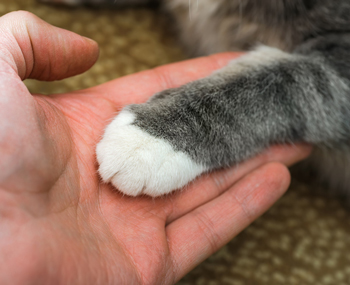Cats Help Humans

Living with cats is fun and unpredictable. They each have their own personality, and they do things that make us laugh. Sure, there is work involved in having a cat, but the love and entertainment they give us usually more than makes up for it.
What you might not know about living with cats is that it can actually improve your health.
Cats Help Decrease Heart Disease in Humans
A study looking at 20 years of heart disease episodes and pet ownership found that people with cats were less likely to die of a heart attack (Adnan I Qureshi, 2009). That's pretty significant!
Petting cats helps people keep their blood pressure low, too, which can decrease the risk of stroke and other scary sequelae of hypertension.
Purrs May Help Heal Humans' Injuries
People have long wondered why cats purr. Science is making new connections all the time, and some of the things they're learning about cat purring are amazing.
A cat's normal purr is between 25 and 150 hertz. Researchers have shown that bones and muscles heal faster when exposed to sounds in the very same frequency range. Some scientists speculate that this might be why cats suffer fewer joint problems than dogs and why they often heal so quickly and well from broken bones.
Many scientists even take it one step further and suggest that humans exposed to cats' purrs may experience faster and better healing of joint, muscle, and bone problems.
Cats Can Help Children
Children who spend their early years in homes with cats might have a decreased tendency to develop allergies and upper respiratory infections. Studies have not been conclusive on this issue, but some of them do point to a lower risk of the development of allergies in kids who grow up with cats.
Additionally, kids with conditions such as autism can benefit from living with cats. A study done in 2012 showed that children with autism whose families got a pet after the child turned five years old showed improvements in sharing behaviors and in offering comfort to others, two areas where autistic children often struggle (Marine Grandgeorge, 2012).
If you needed reasons to have a cat in your home, we think that these are outstanding ones.
Works Cited
- Adnan I Qureshi, M. M. (2009, Jan.). Cat ownership and the Risk of Fatal Cardiovascular Diseases. Results from the Second National Health and Nutrition Examination Study Mortality Follow-up Study. Retrieved from www.ncbi.nlm.nih.gov.
- Marine Grandgeorge, S. T. (2012, Aug. 1). Does Pet Arrival Trigger Prosocial Behaviors in Individuals with Autism? Retrieved from Plos One.
You May Also Like These Articles:
Why Do Some Cats Carry Food Out Of Their Bowls to Eat It?
Why Does My Cat Sleep on My Head?
Why Do Cats Knock Things Over?
Cats Have Personality Traits Similar to Humans
Cat Kneading: Why Do Cats Do It and What Do People Call It?
Notice: Ask-a-Vet is an affiliated service for those who wish to speak with a veterinary professional about their pet's specific condition. Initially, a bot will ask questions to determine the general nature of your concern. Then, you will be transferred to a human. There is a charge for the service if you choose to connect to a veterinarian. Ask-a-Vet is not manned by the staff or owners of CatHealth.com, and the advice given should not delay or replace a visit to your veterinarian.



